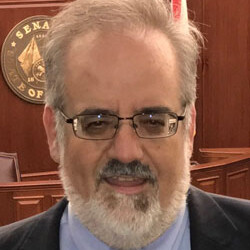As the state tries to fend off a challenge to a similar law, a federal appeals court Wednesday upheld the constitutionality of a Jacksonville ordinance that bars dancers under age 21 from performing in adult entertainment establishments.
A three-judge panel of the 11th U.S. Circuit Court of Appeals ruled that the ordinance does not violate the First Amendment. In a 35-page main opinion, the panel sifted through a tangle of legal precedents and concluded that the “ordinance’s age limitation must be treated as a content-neutral restriction on speech of would-be erotic dancers younger than 21.”
The opinion, written by Judge Kevin Newsom and joined by Judges Robin Rosenbaum and Nancy Abudu, said content-neutral restrictions on speech can be upheld, in part, if they advance “important governmental interests.”
In passing the ordinance, the Jacksonville City Council pointed to an interest in curbing sex trafficking at strip clubs. The opinion said “the city’s evidence is more than sufficient to constitute a ‘reasonable basis’ for concluding that the ordinance will advance its interest in combatting sex trafficking.”
The case involves an ordinance passed in 2022, after legal battles about earlier restrictions. The Atlanta-based appeals court upheld a decision by U.S. District Judge Timothy Corrigan.
State lawmakers and Gov. Ron DeSantis last year approved a law that included preventing strippers under age 21 from performing in adult entertainment establishments across Florida. The law quickly drew a First Amendment challenge from operators of two nude-dancing establishments, a dancer and a retail store that sells adult-oriented items.
With the appeals court considering the Jacksonville case, attorneys asked U.S. District Judge Allen Winsor to put the state-law challenge on hold.
A joint request, filed by lawyers in the state Attorney General’s Office and the plaintiffs’ attorneys, acknowledged the state-law case has “claims and issues” that were not presented in the Jacksonville lawsuit, which includes an establishment known as Wacko’s Too, Inc.
“However, the (state) statute and the ordinance at issue in Wacko’s are similar and the Eleventh Circuit decision is likely to address at least some common issues,” the request said. “Accordingly, a stay is warranted so that the parties and the court can benefit from the guidance likely to be provided by the Eleventh Circuit.”
Winsor on Dec. 5 issued a stay of the case and directed the two sides to file a “status report” within 14 days after the appeals-court ruling in the Jacksonville case.
The lawsuit challenging the state law (HB 7063) was filed by operators of Cafe Risque, a nude-dancing establishment in Alachua County; operators of Sinsations, a nude-dancing establishment in Jacksonville; Serenity Michelle Bushey, who performed at Cafe Risque but was barred by the law from working there because she was under 21; and Exotic Fantasies, Inc., the operator of a retail store in Jacksonville.
The lawsuit alleged the Legislature did not “consider any alternative forms of regulation which would burden First Amendment rights less severely; that is, the Legislature made no effort to solicit information in support of a more narrowly tailored law.” Also, it said the state had not shown a connection between human trafficking and adult entertainment establishments.
“HB 7063 does not actually target human trafficking or the individuals responsible for those criminal acts,” the lawsuit said. “Instead, it regulates only the potential (if unlikely) victims of trafficking and only the subset of potential victims who are actively engaged in speech activities. The state considered no evidence or studies supporting the notion that human trafficking is associated with adult entertainment establishments or that trafficking is more common in such establishments; or, to the extent that such information was considered, it consisted of shoddy data which is insufficient to support the asserted government interest.”
But the state disputed the arguments in a court filing that said the law “is narrowly drawn to further the state’s legitimate interest of protecting this vulnerable age group from human trafficking.”
“The statute furthers an important or substantial governmental interest unrelated to the suppression of free expression,” the motion said. “The statute is part of a larger bill designed to combat human trafficking. The statute prevents persons aged 18 to 20 from working in these establishments because this age group is vulnerable to the exploitation of human trafficking. It does not prevent adult entertainment establishments from hiring nude dancers, employees, and contractors altogether.”
While the appeals court Wednesday upheld the Jacksonville ordinance, Newsom wrote a concurring opinion that said he was skeptical about the legal precedents that effectively required the decision.
Newsom wrote that he thinks the age restriction is “content-based,” which would be harder to justify on First Amendment grounds. But he said the appeals court was not free to reach that conclusion.
“The problem, as I see it, is that the government’s subjective motivation for imposing a speech restriction — whether virtuous, wicked, or somewhere in between — has nothing to do with the threshold question whether the restriction is, objectively, content-based or content-neutral,” Newsom wrote. “That’s a determination to be made on the face of the restriction, not on the government’s underlying purpose or intent.”







